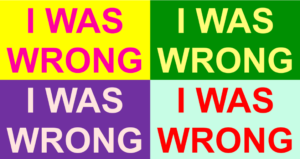 Anthropology is a discipline that has staked its whole methodological approach on the possibility of mistake and failure. When Jean Briggs was ostracized by the Inuit community she was living with for showing anger on their behalf, she turned this awful moment of social failure into a profound reflection on affect and socialization in their culture. The resulting ethnography, Never in Anger, became one of the most famous ethnographies of that era.
Anthropology is a discipline that has staked its whole methodological approach on the possibility of mistake and failure. When Jean Briggs was ostracized by the Inuit community she was living with for showing anger on their behalf, she turned this awful moment of social failure into a profound reflection on affect and socialization in their culture. The resulting ethnography, Never in Anger, became one of the most famous ethnographies of that era.
Even when our failures and mistakes are less obvious than Briggs’ and don’t completely derail our research projects, most anthropologists reflect at some point in their ethnographic writing about moments where they learned something from their research participants that shifted their whole methodological or theoretical approach, or changed what they were studying, after they realized the assumptions they brought into the field with them were wrong. Our iterative approach to co-constructing knowledge with our research participants and collaborators practically demands that we acknowledge when we are wrong in order to move forward.
For this special forum, we are asking anthropologists to reflect on some moment when they realized they were wrong. This could be a moment when you realized a flaw in your methodological approach, an interpretive error, an ethical mistake, or an event that triggered a theoretical paradigm shift. It could be the realization that you took the wrong career path, or that your approach to teaching or doing anthropology needed an overhaul. When did you realize you were wrong? How did you come to that realization? What did you learn? How did you change the way you do or teach or write anthropology?
We are looking for short essays of 2,000-5,000 words (though longer may be appropriate, depending on your topic) that are at once autobiographical and deeply engaged with theoretical and methodological debates in the discipline. These will go through American Ethnologist‘s regular peer review process. Please review our style guidelines at https://americanethnologist.org/journal/submit/. We are particularly interested in sharp, engaging writing that will be accessible to undergraduate students (as our shorter forum articles are often used and assigned for teaching). At the same time, we expect rigorous academic essays that will advance thinking in the discipline. American Ethnologist essays are characterized by the intertwining of theory and ethnography, where each drives the other forward so that ethnography deepens our understanding of theory at the same time that the theory deepens our understanding of the ethnographic material.
Deadline: 16 June 2024
How to submit: Please submit your forum contributions through the normal American Ethnologist submission portal (https://mc.manuscriptcentral.com/americananthro-ae). When you submit, please select the special forum category: “I was wrong.” Be sure to include an abstract (up to 150 words).


